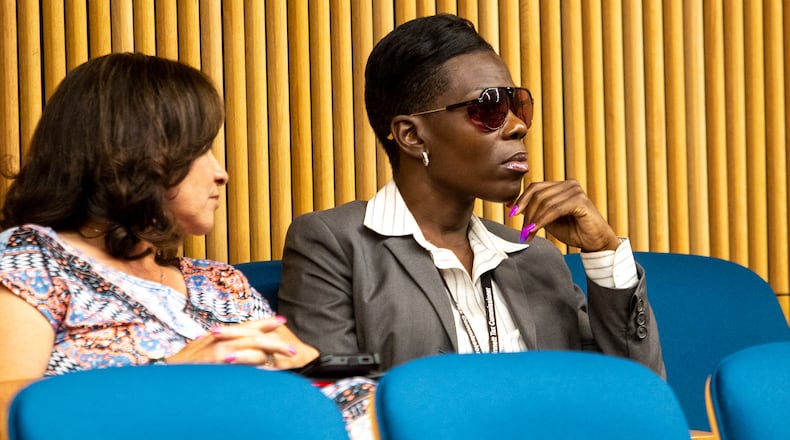A judge will soon decide whether Gwinnett County Tax Commissioner Tiffany P. Porter will be required to collect municipal taxes for a small city of about 5,000 residents.
The lawsuit filed in Gwinnett County Superior Court comes after state legislators hastily passed a bill to prevent the tax commissioner from charging eight cities for municipal tax collection that would have supplemented her $141,098 salary by an additional $110,734.
A hearing was held on August 13 for the lawsuit that the City of Grayson filed against Porter in late July after she declined to collect the city’s property taxes. Public officials who attended the court hearing reported a large crowd attended, including some employees from Porter’s office who appeared to be there in support of her.
The state Legislature took the power to negotiate city-county contracts out of the hands of some tax commissioners and placed it into the hands of county commissions. The new law currently affects only Gwinnett and Fulton counties, as it was written to apply to counties that have 14 or more cities.
The City of Grayson and Gwinnett County Board of Commissioners tested the new law by entering a June agreement without Porter that would obligate her to collect the city’s taxes. Grayson would pay a $1.80-per-parcel fee to the county under the contract but not a personal fee to Porter.
Now, Porter is challenging the constitutionality of the bill signed into law by Gov. Brian Kemp. Former Georgia Supreme Court Chief Justice Leah Ward Sears, who is representing Porter, argued in a counterclaim that the law unconstitutionally redefines duties and targets the tax commissioners of Fulton and Gwinnett.
“(Porter’s) labor and services have been sold by and between others, for those others to reap the benefits and collect the fruits of her labors, without her having had any say in the matter whatsoever,” Sears wrote.
Shortly before the hearing, Grayson Mayor Allison Wilkerson received a county property tax bill with a notice that alerted Grayson residents that they’d receive separate bills for city taxes. The parties entered her bill into exhibits for the case.
Grayson initially listed Gwinnett County as a defendant in the lawsuit, but a judge changed the county into a plaintiff in the case. The county declined to comment on the pending litigation.
Sears argued that the General Assembly would need to change the duties of all tax commissioners across the state rather than the duties of only a few. The Legislature “denied (Porter) freedom of contract and attempted to change the method by which tax collectors and commissioners have been paid for over a century,” she wrote.
Grayson City Attorney Lee Thompson argued that the 14-county threshold applies “uniformly” across the state to counties now and in the future. New cities could be formed in counties currently under the threshold, he said.
The law dictates that counties decide any additional compensation for tax commissioners in counties with more than 50,000 tax parcels or 14 cities, Thompson wrote. The exception for commissioners in these larger counties exists because they already make higher salaries than ones in smaller counties, Thompson wrote.
“It is common practice for general bills to be passed at the Capitol without naming specific counties, but where the implications are such that it will apply to certain parts of the state,” state Rep. Chuck Efstration, R-Dacula, who recommended the bipartisan legislation, told The Atlanta Journal-Constitution. “This is not improper and it takes place with regularity.”
State legislators intend to revisit the law and consider applying it more broadly to affect tax commissioners across the entire state in a later session, Efstration said.
“I applaud Grayson and Gwinnett for saying the tax commissioners should follow the law,” Efstration said. “Tax collectors should not insist on raising taxes to increase their own salary in violation of state code. She knew the salary when she sought election to the position and her predecessors did the job without raising taxes for personal gain.”
State Rep. Donna McLeod, D-Lawrenceville, said she voted in favor of the bill to protect her constituents. Democratic legislators wanted it to apply to all tax commissioners, she said, but Republican legislators wanted to wait and see how it would affect commissioners in smaller counties.
McLeod and state Sen. Nikki Merritt, D-Grayson, both said that they support Grayson in filing the lawsuit. Porter’s proposal to charge the cities “came off greedy,” McLeod said, noting that she had only taken office a few months prior in January.
Sears contends that local jurisdictions cannot dictate the scope of the work that the tax commissioner performs, because she’s a constitutional officer and is not an employee of the county.
“Simply put, neither Gwinnett County nor the City of Grayson can tell Commissioner Porter what to do,” Sears wrote.
Thompson argued that Porter is bound by the contract, as the new law gives Gwinnett County the authority to obligate the tax commissioner to collect taxes for cities.
“The city believes it works very well for their citizens to have their tax bill on the county tax bill, so it can all be paid with one payment,” Thompson told the AJC. “The city of Grayson is a very small city. We only have a couple of employees, so having to process their own tax bills would obviously be a difficult task for them.”
The cities of Lawrenceville, Lilburn, Snellville and Sugar Hill decided to collect property taxes on their own.
Dacula and Peachtree Corners will pay Porter $2 per parcel for her to collect for them. Berkeley Lake will pay $1 per parcel. All together, the fees will boost Porter’s salary by more than $34,000. The three cities will also pay the county $1.80 per parcel for collection.
Only Grayson was left unresolved of the eight cities that Porter sought to charge a personal fee.
Sears told the AJC that regardless of how the judge rules in the case, she expects one of the parties to appeal the decision to a higher court. The parties expect the judge to make a decision in coming days.
About the Author
The Latest
Featured



